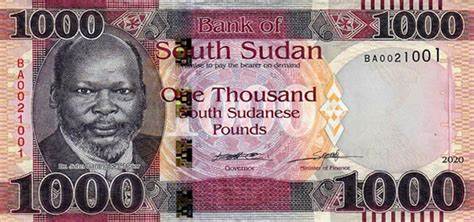
1,000 South Sudanese pound note. | Courtesy
The Bank of South Sudan on Friday said the sharp depreciation of South Sudan currency against the U.S. dollar is partly, due to the country’s dependence on imports from the region.
The pound has plunged to its weakest level since independence – sending commodity prices skyrocketing.
As of Thursday, the exchange rate for one U.S. dollar is at a staggering 990 South Sudanese pounds in the Forex market and around 950 pounds at the Central Bank.
In a press statement on Friday, the bank says it has noted with concern the depreciation of pounds – a situation which is exacerbated by multiple factors.
“These developments are exacerbated, partly by widening balance of payment gap due to import dependence syndrome, multiple external factors such as the hike in interest rate by the Federal Reserve Bank, and global inflationary pressures,” a BOSS statement reads.
South Sudan is landlocked and currently imports about 50 per cent of its needs, including 40 per cent of its cereals from neighboring countries, particularly Kenya, Uganda and Ethiopia, according to African Development Bank.
The Central Bank further said the ferocious fighting in Sudan and geopolitical conflict in eastern Europe have created uncertainties and pushed up food and energy prices.
– High prices –
Some Juba City residents on Thursday complained about the sharp rise of commodity prices in the market caused by the depreciation of the local currency against the U.S. dollar.
Ajok Mathiang, a consumer and broker at the Jebel market said the inflation has made everything expensive including the cheapest commodities and services.
“I run around just like this, and everything as you see is expensive. Food is so expensive when I buy things in sacks, it’s not even enough,” he told Eye Radio.
“I have my brothers children staying with me at home plus my own children and my wife. I make about 15,000 SSP a week, and after that week I have to buy food items in sacks again.”
Mathiang said the price of a cup of tea has jumped from SSP.100 to SSP.400 in five months.
He says his 15,000 wages per week are not enough to cater to his family’s needs when the price of 50 kilograms of flour is now ranging from SSP.35,000 to SSP.45,000.
Some charcoal sellers and boda-boda riders have also decried the hike in commodity prices – saying the worsening exchange rate has left them unable to afford basic needs.
At the northern border regions, Ruweng Administrative Area and Northern Bahr el Ghazal State have complained about a worsening economic situation resulting from the conflict in Sudan.
– Measures –
The Central Bank said its Monetary Policy Committee resolved to coordinate with the Ministry of Finance and Planning to ensure that the Treasury Single Account – a financial policy in use by several countries – is fully and properly implemented.
The Bank also said it will continue to monitor the developments in the Forex market and respond with additional measures when needed.
On May 12, 2023, the Central Bank canceled the auctioning of US dollars to commercial banks and Forex bureaus, saying the foreign exchange committee observed irregularities.
The auctioning policy, which has been criticized by economists, has been employed by the Bank as a measure to curb the worsening depreciation of the pound.
Support Eye Radio, the first independent radio broadcaster of news, information & entertainment in South Sudan.
Make a monthly or a one off contribution.
Copyright 2024. All rights reserved. Eye Radio is a product of Eye Media Limited.